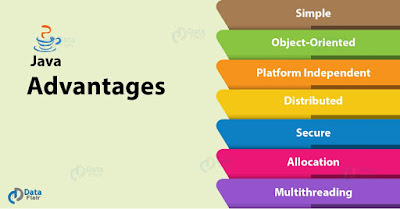1. Advantages of Java
There are some major advantages of Java; let’s see them.
1.1 Simple
Java is straightforward to use, write, compile, debug, and learn than alternative programming languages. Java is less complicated than C++; as a result, Java uses automatic memory allocation and garbage collection.
1.2 Object-Oriented
It permits you to form standard programs and reusable code.
1.3 Platform-Independent
Java code runs on any machine that doesn’t need any special software to be installed, but the JVM needs to be present on the machine.
1.4 Distributed computing
Distributed computing involves several computers on a network working together. It helps in developing applications on networks that can contribute to both data and application functionality.
1.5 Secure
Java has no explicit pointer. Apart from this, it has a security manager that defines the access of classes.
1.6 Memory allocation
In Java, memory is divided into two parts one is heap and another is stack. Whenever we declare a variable JVM gives memory from either stack or heap space. It helps to keep the information and restore it easily.
1.7 Multithreaded
It has the potential for a program to perform many tasks at the same time.
2. Disadvantages of Java
2.1 Performance
Java is memory-consuming and significantly slower than natively compiled languages such as C or C++.
2.2 Look and Feel
The default look of GUI applications written in Java using the Swing toolkit is very different from native applications.
2.3 Single-Paradigm Language
Static imports were added in Java 5.0. The procedural paradigm is better accommodated than in earlier versions of Java.
2.4 Memory Management
In Java, Memory is managed through garbage collection, whenever the garbage collector runs, it affects the performance of the application. This is because all other threads in the have to be stopped to allow the garbage collector thread to work.







0 Comments:
Post a Comment